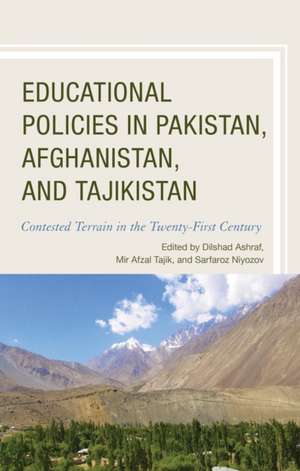Educational Policies in Pakistan, Afghanistan, and Tajikistan
en Limba Engleză Hardback – feb 2017
Preț: 685.09 lei
Preț vechi: 889.74 lei
-23% Nou
Puncte Express: 1028
Preț estimativ în valută:
131.09€ • 136.88$ • 108.25£
131.09€ • 136.88$ • 108.25£
Carte tipărită la comandă
Livrare economică 15-29 aprilie
Preluare comenzi: 021 569.72.76
Specificații
ISBN-13: 9781498505338
ISBN-10: 1498505333
Pagini: 242
Ilustrații: 2 black & white illustrations, 2 tables
Dimensiuni: 238 x 161 x 29 mm
Greutate: 0.5 kg
Editura: Rowman & Littlefield
ISBN-10: 1498505333
Pagini: 242
Ilustrații: 2 black & white illustrations, 2 tables
Dimensiuni: 238 x 161 x 29 mm
Greutate: 0.5 kg
Editura: Rowman & Littlefield
Notă biografică
Cuprins
Contents
Introduction
Dilshad Ashraf and Alan J. DeYoung
Chapter 1: Missing pieces: The case of girls¿ education in Tajikistan
Christopher Whitsel
Chapter 2: The militarization of Afghan women¿s learning in `post-conflict¿ Afghanistan
Spogmai Akseer
Chapter 3: Girls education in Afghanistan: What works and why
Shama Dossa & Parveen Roy
Chapter 4: Islamic Education in post-Soviet Tajikistan: A field of contestations
Sarfaroz Niyozov, Hakim Elnazarov, and Sultonbek Aksakolov
Chapter 5: Religion and state in Pakistani education with special focus on mountainous regions
Jan-e-Alam Khaki
Chapter 6: Creating social cohesion through schooling in Pakistan¿s Swat Valley: One UNICEF approach
Parveen Roy and Alan DeYoung
Chapter 7: Building communities by building schools in the rural mountainous regions of Pakistan
Mir Afzal Tajik
Chapter 8: Narratives of Schooling during the Tajik Civil War (1992-97)
Carole Faucher
Chapter 9: Schooling and the Problem of Indigenous Cultural Identity in Baltistan
Zakir Hussain
Conclusion: Transforming Contested Education Terrains into Opportunities for Hope and Peace
Sarfaroz Niyozov & Jan-e-Alam Khaki
About the Contributors
Descriere
This book analyzes the successes and impediments of various educational policies in Pakistan, Tajikistan, and Afghanistan. The authors analyze how current and past discourses on gender, religion, culture, politics, and the economy affect formal education and communal transformation in mountainous regions.
